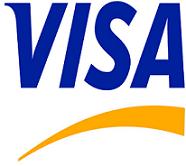Antitrust Suit
Visa Says Justice Department Weighing Antitrust Suit
 Visa Inc., the world's biggest payments network, fell as much as 5 percent after saying the U.S. Department of Justice may sue the company over a policy that bars merchants from charging extra to customers who pay with credit cards.
Visa Inc., the world's biggest payments network, fell as much as 5 percent after saying the U.S. Department of Justice may sue the company over a policy that bars merchants from charging extra to customers who pay with credit cards.
"The department has indicated that it is considering filing a civil lawsuit," Chief Executive Officer Joseph W. Saunders said yesterday in a conference call with analysts after San Francisco-based Visa reported fiscal third-quarter results. "We are currently engaged in constructive negotiations with the department to resolve its concerns as it relates to Visa without litigation or payment of monetary damages."
Visa, American Express Co. and Purchase, New York-based MasterCard Inc. disclosed in 2008 that the Justice Department was investigating the companies over so-called anti-surcharging policies and rules prohibiting merchants from "steering" customers to other forms of payment.
The Justice Department's antitrust division is "investigating whether certain credit-card network rules regarding merchants' treatment of various payment forms, including credit cards, are anticompetitive," spokeswoman Gina Talamona said in an e-mail. She declined to discuss specific companies.
Visa dropped $3.40, or 4.5 percent, to $71.78 at 1:04 p.m. in New York Stock Exchange composite trading after touching $71.40. MasterCard declined 1.7 percent and AmEx fell less than 1 percent.
'Regulatory Uncertainty'
The Dodd-Frank Act includes provisions that address some of the complaints raised by the Justice Department and a pending federal antitrust lawsuit brought by merchants against Visa and MasterCard. One of the rules pushed by U.S. Senator Richard Durbin, the Illinois Democrat and majority whip, will allow merchants to offer discounts for various forms of payment.
FBR Capital Markets analyst Scott Valentin cited "regulatory uncertainty" in lowering his forecast for Visa, saying the shares may climb to $96 within 12 months, down from $115.
"Management commentary lacked specifics regarding the impact of the Durbin amendment," Valentin said today in a note to clients. He continues to rate the shares "outperform."
The legislation and Saunders's comments may indicate that Visa also is working to avoid a trial by settling the merchants' lawsuit, said Jason Kupferberg, an analyst with UBS Securities LLC.
'Differential Pricing'
"The Durbin amendment has effectively legalized differential pricing for all tender types, which may address the anti-surcharging and anti-steering practices that the DOJ was examining," Kupferberg said in an interview.
It's too early to tell whether the legislation and a Justice Department lawsuit would lead to a settlement in the merchants' case, said K. Craig Wildfang, lead attorney for the plaintiffs.
"Having another government agency conclude that these things are anticompetitive -- it's been true around the world -- and to have the DOJ weigh in on this, would be, in the grand scheme of things, helpful to the private plaintiffs," Wildfang said in a telephone interview.
MasterCard, which is scheduled to report second-quarter results on Aug. 3, didn't address Visa's comments.
"We've been cooperating fully with the DOJ since they issued their civil investigative demand in October 2008," MasterCard spokesman James Issokson said in a telephone interview.
Joanna Lambert of New York-based American Express declined to comment.
(Published by Bloomberg - July 29, 2010)